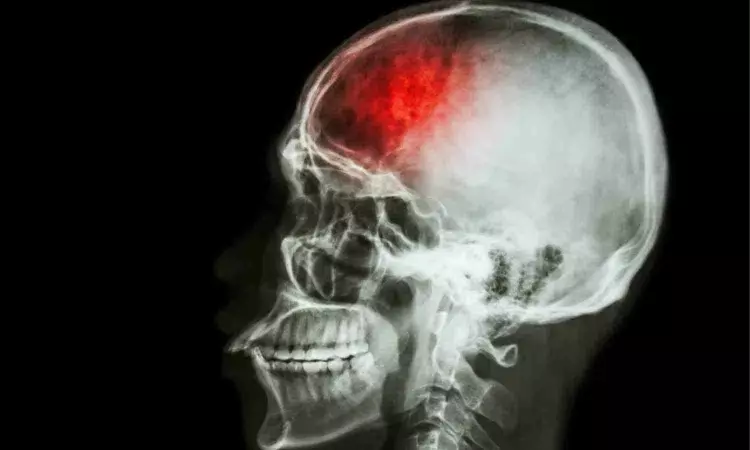- Home
- Medical news & Guidelines
- Anesthesiology
- Cardiology and CTVS
- Critical Care
- Dentistry
- Dermatology
- Diabetes and Endocrinology
- ENT
- Gastroenterology
- Medicine
- Nephrology
- Neurology
- Obstretics-Gynaecology
- Oncology
- Ophthalmology
- Orthopaedics
- Pediatrics-Neonatology
- Psychiatry
- Pulmonology
- Radiology
- Surgery
- Urology
- Laboratory Medicine
- Diet
- Nursing
- Paramedical
- Physiotherapy
- Health news
- Fact Check
- Bone Health Fact Check
- Brain Health Fact Check
- Cancer Related Fact Check
- Child Care Fact Check
- Dental and oral health fact check
- Diabetes and metabolic health fact check
- Diet and Nutrition Fact Check
- Eye and ENT Care Fact Check
- Fitness fact check
- Gut health fact check
- Heart health fact check
- Kidney health fact check
- Medical education fact check
- Men's health fact check
- Respiratory fact check
- Skin and hair care fact check
- Vaccine and Immunization fact check
- Women's health fact check
- AYUSH
- State News
- Andaman and Nicobar Islands
- Andhra Pradesh
- Arunachal Pradesh
- Assam
- Bihar
- Chandigarh
- Chattisgarh
- Dadra and Nagar Haveli
- Daman and Diu
- Delhi
- Goa
- Gujarat
- Haryana
- Himachal Pradesh
- Jammu & Kashmir
- Jharkhand
- Karnataka
- Kerala
- Ladakh
- Lakshadweep
- Madhya Pradesh
- Maharashtra
- Manipur
- Meghalaya
- Mizoram
- Nagaland
- Odisha
- Puducherry
- Punjab
- Rajasthan
- Sikkim
- Tamil Nadu
- Telangana
- Tripura
- Uttar Pradesh
- Uttrakhand
- West Bengal
- Medical Education
- Industry
After mild stroke, more sleep or time spent trying to sleep tied to thinking problems, finds research

After a mild stroke or transient ischemic attack (TIA), people who spend more time in bed sleeping or trying to sleep may be more likely to have lower scores on tests of thinking and memory skills and changes in their brains that can lead to dementia or second strokes, according to a study published on May 28, 2025, online in Neurology®, the medical journal of the American Academy of Neurology.
Spending longer in bed-when some of that time can be not sleeping due to difficulty falling asleep, fragmented sleep, poor quality sleep or other problems-can be a sign of a sleep disorder. The study found that both people with longer in-bed times and with longer sleep durations were more likely to have these brain changes.
The study does not prove that these sleep issues cause these brain changes and thinking problems; it only shows an association.
“These results show that disturbed sleep may be a marker of adverse brain health, even for people with mild strokes or TIAs,” said study author Joanna M. Wardlaw, MD, of the University of Edinburgh in the United Kingdom. “While many people know that a lack of sleep can lead to health issues, less is known about the effects of sleeping longer at night or spending a long time in bed trying to make up for having trouble sleeping-whether people are doing this consciously or not.”
The study involved 422 people from Edinburgh and Hong Kong with an average age of 66 who had a mild stroke or a TIA, which is also called a “mini stroke.” Within one to three months after the stroke, all participants had brain scans, filled out sleep questionnaires and took cognitive tests.
The participants had an average score of one point on a test where scores of one to four indicate a mild stroke.
People who spent a longer time in bed were more likely to have signs of damage to small blood vessels in the brain, including a greater volume of white matter hyperintensities, or areas in the white matter of the brain where brain tissue has been damaged. They were also more likely to have slightly lower scores on the test of thinking and memory skills.
People who had longer sleep duration were more likely to have small areas of microhemorrhages, or microbleeds, in the brain.
“More research is needed to confirm these findings and also to look at whether prolonged sleep has negative effects on people who have never had a stroke or TIA,” Wardlaw said. “Of course, research is also needed on whether improving people’s sleep patterns after stroke could ward off some of these possible detrimental effects.”
The study was a snapshot in time-it did not follow participants to see changes over time, and researchers did not look at participants’ sleep quality before they had strokes.
Reference:
Joanna M. Wardlaw, Association of Self-Reported Sleep Metrics With Imaging Markers of Small Vessel Disease and Cognition in Patients With TIA or Mild Stroke, Neurology, https://doi.org/10.1212/WNL.0000000000213734.
Dr Kamal Kant Kohli-MBBS, DTCD- a chest specialist with more than 30 years of practice and a flair for writing clinical articles, Dr Kamal Kant Kohli joined Medical Dialogues as a Chief Editor of Medical News. Besides writing articles, as an editor, he proofreads and verifies all the medical content published on Medical Dialogues including those coming from journals, studies,medical conferences,guidelines etc. Email: drkohli@medicaldialogues.in. Contact no. 011-43720751


